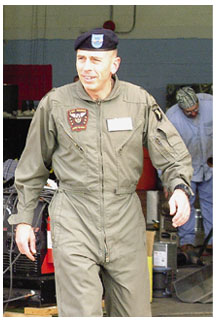
 |
|
David Petraeus *85 *87 |
David Petraeus *85 *87
Major Gen. David Petraeus was nine years out of West Point when the Army sent him to graduate school at the Woodrow Wilson School. Last July, he became commander of the 101st Airborne Division – the famed “Screaming Eagles,” trained to go into combat anywhere in the world in 36 hours – and commanding general of Fort Campbell, Kentucky, where he leads more than 23,000 soldiers. Petraeus also has served as assistant chief of staff for operations of the NATO force in Bosnia, and as deputy commander of the U.S. Joint Interagency Counter-Terrorism Task Force in Bosnia. Here, he speaks with Chantal Escoto, a writer in Clarksville, Tennessee.
What would Fort Campbell’s role be if the U.S. were to go to war against Iraq?
The 101st Airborne and the other units here, including the 5th Special Forces Group and the 160th Special Operations Aviation Regiment, typically get involved with whatever goes on. Many soldiers from these units fought in Afghanistan, and it’s very likely we’d be involved were the president to commit forces in Iraq or elsewhere. We all recognize this. So there is considerable seriousness of purpose among our soldiers, and we’re training hard.
Can you describe a typical day?
A typical day begins when I leave our quarters at 5:30 a.m. I listen to the news on N.P.R. for the five minutes or so it takes me to get to headquarters – the timing has to be just right to catch the news. I then read the overnight e-mail and messages. At 6:30, we have physical training — calisthenics, running, road marches, working out in the gym, and so forth — for about 90 minutes. During the day I’ll hold a couple of meetings with other officers and staff, and then head out to the field to observe training.
Most of the day — and often well into the night — is spent in the field observing our units, helping train our brigade and battalion commanders, and developing our proficiency in the complex missions carried out by the 101st. A lot of our training is done at night because that’s when we prefer to conduct helicopter assaults or attack helicopter operations. At the end of all that, we’ll either sleep in the field or come back in for the rest of the night, and get ready to do it all again the next day.
I spend a fair amount of time away from Fort Campbell as well. We now have nearly 3,000 soldiers deployed around the world on missions and training exercises, and I work hard to get out to see them and what they’re doing, and to see the conditions under which they’re operating.
Your Princeton dissertation dealt with the influence of Vietnam on military thinking regarding the use of force. If you were teaching a class about the use of military force today, what question would you most want students to consider?
I would want them to examine the capabilities and limitations of military force as an instrument of national power. As General [Henry] Shelton was fond of saying while serving as chairman of the Joint Chiefs of Staff – I was his executive assistant for two of his years as chairman – “The military makes a great hammer, but not every problem is a nail.”
You have a reputation in the Army for being in great shape and recovering quickly when you’ve been injured.
That reputation’s been earned the hard way. I got shot in a freak training accident during a live-fire exercise here in 1991 – took an M-16 round through my chest. The surgeon who performed thoracic surgery on me was Dr. Bill Frist [’74], now the senior senator from Tennessee. He did a great job, and I was able to run competitively again in a couple of months.
I also had a real tough landing skydiving two years ago and broke my pelvis. That was very, very painful – the worst injury I’ve ever had. But, again, I healed very well. I ran the Army Ten-Miler in October in a little under 64 minutes.
What can Princetonians learn from a place like Fort Campbell?
No one spends time with a unit like this without
being inspired by the dedication, selfless spirit, and physical and mental
toughness of our troopers. Invariably, our soldiers demonstrate tremendous
fortitude in the face of challenge and hardship, and it’s hard not
to draw energy from them. ![]()
By Chantal Escoto
